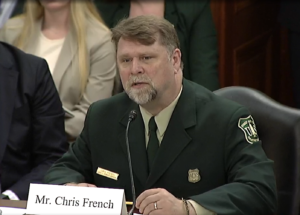A bill that would allow more efficient and timely management of federal forests to benefit wildlife habitat, wildfire mitigation and overall forest health got some attention in the nation’s capital. The Senate Committee on Agriculture, Nutrition and Forestry held a hearing on May 6 to ask questions about the Fix Our Forests Act, the top legislative priority of the Rocky Mountain Elk Foundation.
“We can all agree that more active forest management is needed but we must make sure we have the resources to do it, and we keep the employees to do it,” said Sen. Amy Klobuchar (D-MN), committee ranking member.
Committee members directed their questions at Chris French, acting associate chief of the U.S. Department of Agriculture (USDA) Forest Service.
 “Our national forests are facing great challenges – uncharacteristically severe wildfires, insect and disease outbreaks, invasive species and many other stressors,” said French. “The Fix Our Forests Act works to address these issues as well as a variety of other new programs and amendments to existing authorities. USDA supports the bill and would like to continue to work with the subcommittee on technical changes.”
“Our national forests are facing great challenges – uncharacteristically severe wildfires, insect and disease outbreaks, invasive species and many other stressors,” said French. “The Fix Our Forests Act works to address these issues as well as a variety of other new programs and amendments to existing authorities. USDA supports the bill and would like to continue to work with the subcommittee on technical changes.”
French highlighted several parts of the legislation to support streamlining and efficiency. Among them was fixing the “problematic Cottonwood decision,” a 2015 ruling by the Ninth Circuit Court that frustrates forest management by requiring costly and duplicative re-consultations over endangered species even when the proposed projects are to improve wildlife habitat. RMEF agreed with past efforts by both the Obama and Trump administrations to try to overturn it.
The Cottonwood decision also spawned seemingly nonstop frivolous litigation from environmental groups. French said that Region 1 of the U.S. Forest Service (Montana and Idaho) as well as Region 6 (Washington, Oregon) and Region 5 (California) are the most litigated areas in the national system. These states are in the ninth judicial circuit where the Cottonwood decision applies.
“Litigation that we often will get on vegetation management fuels reduction projects will add about $100,000 to $125,000 on to the cost of every project. And it adds considerable burden in terms of time frame, so for a community that is looking for us to perform a hazardous fuels reduction project in and around their community, we may propose it and be ready to implement it within about a year and a half but if it goes under litigation, we may not actually be able to implement it for three to four years or longer.”
French also emphasized the importance of prescribed fire as an effective a tool to reduce the risk of high intensity wildfires. He praised state, tribal and local governments and other groups for their work in carrying out meaningful forestry and habitat improvements.
The U.S. House passed its version of the Fix Our Forests Act by a vote of 279-141 in January. To become law, the Senate would have to pass its version and then meld the two versions into one before sending it for a presidential signature.
Click here to watch video clips of the hearing.
(Photo credit: Rocky Mountain Elk Foundation/Senate Committee on Agriculture, Nutrition and Forestry)
